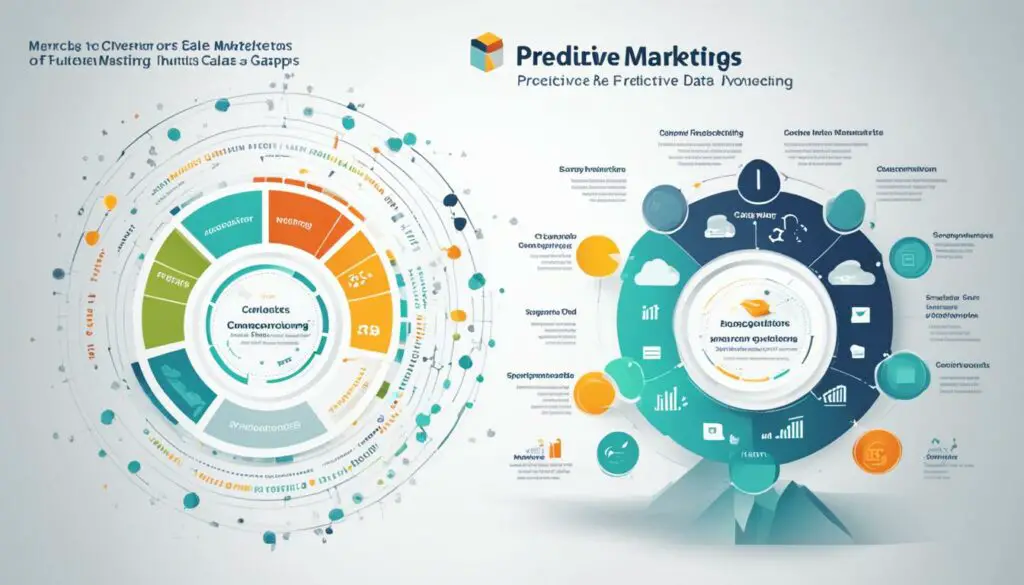Big data has emerged as a transformative force in the field of marketing, revolutionizing the way businesses understand and engage with their target audience. With an overwhelming volume of data being generated every day, marketers are leveraging the power of big data to drive successful marketing strategies and achieve business growth.
To stay competitive in today’s data-driven world, it is crucial for marketers to understand and harness the opportunities presented by big data. With 80% of Fortune 1000 companies increasing their investments in big data and artificial intelligence, it is clear that the importance of big data in marketing analytics cannot be overstated.
Key Takeaways:
- Big data is a game-changer in marketing, offering valuable insights into consumer behavior and trends.
- Businesses can consolidate customer data and create personalized marketing efforts through big data analysis.
- Data-driven decision-making leads to improved campaign performance and efficient resource allocation.
- Examples of leveraging big data in marketing include customer segmentation, predictive analytics, and optimizing the customer journey.
- While big data brings numerous benefits, businesses must also address challenges such as data privacy and information overload.
Understanding the Role of Big Data in Marketing
Big data plays a crucial role in modern marketing strategies, providing businesses with valuable insights into consumer behavior and preferences. By collecting and analyzing massive volumes of structured and unstructured data from various sources such as social media, customer interactions, and marketing campaigns, marketers can gain a deeper understanding of their target audience.
With the help of advanced analytics and data-driven methodologies, businesses can make smarter decisions based on solid data. Big data allows marketers to identify trends, patterns, and correlations that can inform marketing strategies and drive business growth. By leveraging the power of big data, businesses can achieve a competitive advantage in the market and effectively target their marketing efforts.
One of the key advantages of utilizing big data in marketing is the ability to personalize marketing campaigns. By analyzing customer data, businesses can tailor their messaging, offers, and content to cater to the individual preferences and needs of their customers. This personalized approach leads to higher customer engagement, improved brand loyalty, and increased conversion rates.
Furthermore, big data enables marketers to optimize their marketing efforts by identifying trends and predicting future customer behavior. By understanding consumer preferences and trends, businesses can optimize their product offerings, pricing strategies, and promotional activities. This data-driven approach allows businesses to allocate their resources effectively, maximize return on investment (ROI), and ensure that marketing campaigns resonate with the target audience.
It is important for businesses to invest in the right technology and expertise to harness the power of big data effectively. Skilled data analysts and data scientists play a critical role in interpreting the data and extracting valuable insights. By staying up to date with the latest advancements in technology and data analytics, marketers can fully leverage big data to drive their marketing strategies and achieve business success.
Benefits of Big Data in Marketing:
- Personalized marketing campaigns
- Optimized marketing efforts and resource allocation
- Improved customer engagement and brand loyalty
- Enhanced targeting and segmentation
- Predictive analytics for future trends and customer behavior
The Benefits of Big Data in Marketing
Embracing big data in marketing offers numerous advantages for businesses. Firstly, it enables marketers to consolidate customer data and create a holistic view of individual preferences, purchase history, and engagement patterns, leading to more personalized marketing efforts.
- Consolidated Customer Data: By harnessing big data, marketers can gather and analyze vast amounts of customer data from various sources, such as social media, website interactions, and purchase data. Consolidating this data allows businesses to develop a comprehensive understanding of individual customers and their preferences.
- Personalized Marketing: Armed with a complete view of customer preferences, marketers can create highly targeted and personalized marketing campaigns. They can deliver relevant content, offers, and recommendations to each customer, increasing the likelihood of engagement, conversion, and customer loyalty.
Secondly, data-driven marketing allows for real-time insights, leading to improved decision-making and the ability to quickly adjust campaigns based on market trends and consumer behavior.
- Real-time Insights: Big data analytics provides marketers with real-time insights into consumer behavior, market trends, and campaign performance. Marketers can monitor and analyze data in real-time, allowing them to make data-driven decisions promptly and adjust their marketing strategies on the fly.
- Agile Campaign Optimization: By leveraging real-time insights, marketers can optimize their campaigns on the go. They can identify which marketing efforts are generating the desired results and quickly make necessary adjustments to improve performance and ROI. This agility enables businesses to stay competitive in a fast-paced and ever-changing market.
Thirdly, optimizing marketing efforts through data analysis leads to efficient resource allocation, maximizing return on investment (ROI) and reducing wasted ad spend.
- Efficient Resource Allocation: Data-driven decision-making allows marketers to allocate their resources more efficiently. By analyzing data, businesses can identify which marketing channels, campaigns, or strategies are delivering the best ROI. They can then prioritize and invest their resources in those areas, minimizing wasteful spending and maximizing the impact of their marketing efforts.
Finally, big data provides valuable information for new product development, allowing businesses to address customer needs and pain points with innovative solutions.
- Innovation and Product Development: By analyzing customer data, businesses can identify gaps in the market and gain insights into customer needs and pain points. This information can be used to develop innovative new products or enhance existing ones, ensuring that businesses stay ahead of the competition and cater to their customers’ evolving demands.
Examples and Use Cases of Big Data in Marketing
Big data has proven to be a game-changer in the field of marketing, offering businesses valuable insights and opportunities to drive marketing success. Here are some examples and use cases that demonstrate how big data can be effectively leveraged for marketing:
1. Discovering New Customer Acquisition Levers
By analyzing vast amounts of data, businesses can identify new channels and strategies to acquire customers. This includes understanding which marketing channels are most effective in reaching and converting potential customers.
2. Segmenting Audiences for Personalized Marketing Campaigns
Big data enables businesses to segment their audiences based on various factors such as demographics, behavior, and preferences. This allows for tailored marketing campaigns and personalized content that resonates with specific customer segments.
3. Using Predictive Analytics to Communicate the Right Message
With big data, businesses can use predictive analytics to anticipate customer behavior and preferences. This allows them to deliver targeted messages and offers to individual customers at the right time, increasing the likelihood of conversion and engagement.
4. Fostering Customer Retention and Loyalty Programs
Big data can help identify patterns and indicators of customer churn. By analyzing customer data, businesses can proactively implement retention strategies and loyalty programs to enhance customer satisfaction and foster long-term loyalty.
5. Optimizing Pricing Decisions
Through analyzing market trends and customer data, big data can inform pricing decisions. Businesses can optimize their pricing strategies based on competitors’ prices, customer willingness to pay, and demand patterns to maximize profitability while remaining competitive in the market.
6. Analyzing Customer Sentiment through Sentiment Analysis
Big data analysis allows businesses to gain insights into customer sentiment through sentiment analysis. By analyzing social media data, reviews, and customer feedback, businesses can understand customer opinions, preferences, and satisfaction levels, helping them make informed decisions to improve products and marketing strategies.
7. Conducting A/B Testing
Big data enables businesses to conduct A/B testing by comparing the performance of different marketing approaches. This allows them to identify the most effective strategies, messaging, and creative elements, optimizing marketing campaigns for better results.
8. Optimizing the Customer Journey
Big data analysis allows businesses to analyze and optimize the customer journey by identifying key touchpoints and areas for improvement. This helps businesses create a seamless and personalized experience for customers, enhancing engagement and satisfaction.
9. Building Data Products that Delight Customers
Big data can be leveraged to build data products that provide additional value to customers. This can include personalized recommendations, interactive dashboards, or tools that allow customers to analyze their own data, enhancing their overall experience and engagement with the brand.
These examples highlight the diverse ways businesses can leverage big data to drive marketing success. By harnessing the power of big data, businesses gain valuable insights and opportunities to optimize marketing strategies, enhance customer experience, and achieve business growth.
Challenges of Big Data in Marketing
While big data provides significant benefits to the field of marketing, it also brings certain challenges that businesses must address. One of the main challenges is ensuring data privacy and compliance with regulations, which is crucial for maintaining customer trust. Businesses need to handle and protect customer data responsibly, implement robust security measures, and adhere to data protection laws to safeguard sensitive information from unauthorized access or malicious activities.
Leveraging big data in marketing requires advanced technology and skilled personnel for effective data analysis. With the sheer volume of data available, marketers need to have the necessary infrastructure, tools, and expertise to analyze and extract valuable insights. This includes employing data scientists, data analysts, and other professionals who can navigate complex datasets, perform accurate analysis, and interpret the data to drive actionable marketing strategies.
The abundance of data can also lead to information overload, making it essential for marketers to have proper strategies in place to extract meaningful insights without getting overwhelmed. They need to focus on identifying the most relevant data points, implementing robust data management practices, and utilizing advanced analytics techniques to derive insights that can inform decision-making and drive marketing success.
Data privacy and the responsible use of big data continue to be critical concerns for businesses operating in the digital age. Striking the right balance between utilizing data effectively for marketing purposes and respecting consumer privacy rights is essential. By prioritizing data protection, investing in advanced technology, and developing robust data management strategies, businesses can overcome the challenges of big data and maximize its potential to drive successful marketing campaigns.
The Evolution of Technology and Big Data in Marketing
The rapid evolution of technology in the digital age has had a profound impact on marketing strategies. As businesses strive to stay competitive in an increasingly data-driven landscape, the influence of big data has become undeniable. By leveraging the power of big data, businesses can gain valuable insights into consumer behavior and make more informed decisions to shape their marketing efforts.
Big data has transformed the way businesses understand their customers. Through data analysis, businesses can uncover patterns, trends, and preferences that were once difficult to identify. This has revolutionized marketing strategies, allowing businesses to create customized and targeted campaigns that resonate with their target audience.
By analyzing customer data, businesses can gain a deeper understanding of their customers’ needs, preferences, and buying habits. This enables marketers to develop more personalized marketing strategies, delivering tailored messages and offers to individual customers. The ability to segment and target specific customer segments based on their unique characteristics has proven to be highly effective in achieving marketing objectives.
Furthermore, big data allows for real-time insights, enabling businesses to adapt and optimize their marketing campaigns on the fly. By monitoring and analyzing data in real-time, marketers can quickly identify trends and adjust their strategies accordingly. This flexibility and agility give businesses a significant advantage in a fast-paced and ever-changing market.
With the continuous evolution of technology, big data is set to play an even more significant role in marketing strategies. As more data becomes available and technology advances, businesses will have access to deeper and more comprehensive insights into consumer behavior. This will enable marketers to refine their targeting strategies, improve customer engagement, and drive business growth.
Example Table: Evolution of Technology and its Impact on Marketing
| Technological Advancement | Impact on Marketing |
|---|---|
| Social Media | Enables businesses to gather vast amounts of customer data and engage with their target audience on a personal level. |
| Artificial Intelligence | Empowers marketers to analyze big data at scale, automate processes, and deliver personalized experiences to customers. |
| Internet of Things | Provides opportunities for data collection from connected devices, allowing for enhanced consumer insights and targeted marketing strategies. |
| Mobile Technology | Facilitates real-time consumer interactions, location-based marketing, and personalized messaging through mobile apps and notifications. |
The evolution of technology and the increasing influence of big data have forever changed the way businesses approach marketing. By harnessing the power of big data, marketers can gain deep insights into consumer behavior, optimize their strategies, and deliver personalized experiences that drive business success.
Personalization and Targeted Marketing with Big Data
Personalization has become a necessity in today’s competitive market. Businesses are leveraging the power of big data to personalize their marketing efforts and target specific customer segments. By segmenting customers based on factors such as age, location, and buying behavior, businesses can deliver personalized content and offers that resonate with each segment. This approach not only increases customer engagement and satisfaction but also leads to higher conversions and customer loyalty.
Benefits of Personalization in Marketing
The benefits of personalization in marketing are numerous. Firstly, personalized marketing campaigns are more relevant to customers, resulting in increased customer engagement and response rates. Secondly, targeting specific customer segments allows businesses to tailor their messaging and offers to meet the unique needs and preferences of each segment, driving higher conversion rates. Additionally, personalization fosters a stronger emotional connection between customers and brands, leading to increased customer loyalty and advocacy.
Examples of Personalization in Marketing
There are various examples of how big data enables personalization in marketing. E-commerce platforms use customers’ browsing and purchase history to recommend personalized product suggestions. Streaming services create personalized playlists and content recommendations based on users’ preferences and viewing history. Retailers send personalized emails with promotions and offers based on customers’ interests and past purchases. These examples demonstrate how personalization can significantly enhance the customer experience and drive better marketing results.
Importance of Data Analysis in Personalization
Data analysis plays a crucial role in personalization. By analyzing customer data, marketers can gain valuable insights into customer behavior, preferences, and patterns. This data-driven approach allows businesses to make smarter decisions and optimize their marketing strategies for better results. From identifying customer segments to creating personalized messaging and offers, data analysis is the foundation of effective personalization in marketing.
Predictive Analytics and Future Trends
Predictive analytics plays a crucial role in marketing by leveraging big data to forecast future trends and customer behavior. By analyzing historical data, businesses can make informed predictions regarding customer preferences, market trends, and potential risks. This valuable information enables marketers to plan their marketing strategies more effectively and take proactive measures to stay ahead of the competition.
Predictive analytics in marketing involves utilizing advanced algorithms and statistical techniques to analyze large datasets and identify patterns and correlations. By understanding these patterns, marketers can anticipate customer behavior and make data-driven decisions that align with future expectations.
One of the main applications of predictive analytics in marketing is forecasting customer behavior. By analyzing past customer interactions, purchase history, and demographic data, businesses can predict future customer preferences and tailor their marketing efforts accordingly. This helps in creating targeted and personalized campaigns that resonate with customers and drive higher engagement and conversions.
Another aspect of predictive analytics in marketing is forecasting market trends. By analyzing market data and external factors such as economic indicators, social trends, and industry developments, businesses can identify emerging trends and adapt their marketing strategies accordingly. This allows them to target the right audience at the right time and capitalize on new opportunities.
Additionally, predictive analytics can help businesses identify potential risks and challenges that may impact their marketing efforts. By analyzing historical data and identifying patterns of market disruptions or customer churn, businesses can take proactive measures to mitigate risks and develop contingency plans. This enables them to navigate uncertain market conditions and make strategic decisions that mitigate potential losses.
Overall, predictive analytics empowers marketers to leverage big data and make data-driven decisions based on future expectations. By accurately forecasting customer behavior and market trends, businesses can optimize their marketing strategies and stay ahead in today’s competitive landscape.

Enhancing Customer Experience with Big Data
Big data has emerged as a powerful tool for businesses to enhance the customer experience. By leveraging the vast amount of customer feedback and online reviews, companies can gain valuable insights into areas where their products or services can be improved. This analysis allows businesses to make necessary changes and provide a better overall customer experience.
One of the key benefits of using big data in customer experience enhancement is the ability to understand the customer journey. By analyzing customer data at various touchpoints, businesses can identify pain points and areas of friction. This understanding enables them to optimize these touchpoints and create a seamless and personalized experience for their customers.
Take for example a retail company utilizing big data to improve their online shopping experience. By analyzing customer feedback and online reviews, they may discover that customers find the checkout process to be confusing and time-consuming. Armed with this information, the company can make necessary changes to streamline the checkout process, eliminating unnecessary steps and improving overall efficiency.
Additionally, big data allows businesses to personalize the customer experience based on individual preferences and behaviors. By analyzing customer data, such as past purchase history, browsing behavior, and demographic information, companies can tailor their marketing messages and recommendations to suit each customer’s unique needs and interests. This level of personalization not only enhances the customer experience but also increases customer satisfaction and loyalty.
Benefits of Enhancing Customer Experience with Big Data:
- Improved customer satisfaction and loyalty
- Increased customer engagement and brand advocacy
- Higher conversion rates and sales
- Enhanced competitive advantage
By utilizing big data to analyze customer feedback, optimize touchpoints, and personalize the customer experience, businesses can differentiate themselves in a competitive market and build long-lasting relationships with their customers.
Conclusion
Big data has revolutionized marketing, providing businesses with invaluable insights into consumer behavior and enabling data-driven decision-making. By harnessing the power of big data, businesses can personalize their marketing efforts, optimize pricing strategies, foster customer loyalty, and enhance the overall customer experience.
However, it is important for businesses to address the challenges that come with big data, such as data privacy issues and information overload. Safeguarding customer data and ensuring compliance with regulations is crucial to maintain trust and loyalty. Additionally, having the right technology and skilled personnel in place is essential to effectively analyze and extract insights from the vast amount of data available.
As technology continues to advance, the role of big data in marketing will only become more prominent. It will shape the future of marketing strategies by providing real-time insights, enabling businesses to adapt and stay ahead of the competition. Embracing big data is no longer an option for businesses that want to thrive in a data-driven world.
FAQ
What is big data and how does it relate to marketing?
Big data refers to the massive volume of structured and unstructured data that businesses collect from various sources. In marketing, big data is used to gain valuable insights into consumer behavior, preferences, and trends, enabling marketers to make data-driven decisions and create more targeted and personalized marketing efforts.
What are the benefits of using big data in marketing?
Leveraging big data in marketing offers several benefits. It allows marketers to consolidate customer data for a holistic view, make real-time insights for improved decision-making, optimize marketing efforts for efficient resource allocation, and gain valuable insights for new product development.
Can you provide some examples of how big data is utilized in marketing?
Certainly! Some examples include discovering new customer acquisition levers, segmenting audiences for personalized marketing campaigns, using predictive analytics to communicate the right message, fostering customer retention and loyalty programs, optimizing pricing decisions, analyzing customer sentiment through sentiment analysis, conducting A/B testing, optimizing the customer journey, and building data products that delight customers.
What challenges does big data present in marketing?
One of the main challenges is ensuring data privacy and compliance with regulations. Additionally, leveraging big data requires advanced technology and skilled personnel for data analysis. The sheer volume of data can also lead to information overload, making it essential for marketers to have proper strategies in place to extract valuable insights without getting overwhelmed.
How does big data influence marketing strategies in the digital age?
Big data plays a significant role in shaping effective marketing strategies by providing valuable insights into consumer behavior. It enables businesses to personalize their marketing efforts, optimize pricing strategies, foster customer loyalty, and enhance the overall customer experience.
How does big data help with personalization and targeted marketing?
Big data enables businesses to segment their customers based on various factors such as age, location, and buying behavior, allowing for targeted marketing campaigns that deliver personalized content and offers to each customer segment. This approach increases customer engagement and satisfaction, ultimately leading to higher conversions and customer loyalty.
What is predictive analytics and how does it relate to big data in marketing?
Predictive analytics is a powerful technique that utilizes big data to forecast future trends and customer behavior. By analyzing past data, businesses can make informed predictions about customer preferences, market trends, and potential risks. This information enables marketers to plan their marketing strategies more effectively and stay ahead of the competition by making data-driven decisions based on future expectations.
How does big data enhance the customer experience?
By analyzing customer feedback and online reviews, businesses can identify areas of improvement in their products or services, allowing them to make necessary changes and provide a better overall customer experience. Big data also helps businesses understand the customer journey and identify any pain points, enabling them to optimize touchpoints and create a seamless and personalized experience for their customers.
What is the overall impact of big data in marketing?
Big data has revolutionized marketing, offering businesses valuable insights into consumer behavior and enabling data-driven decision-making. By leveraging big data, businesses can personalize their marketing efforts, optimize pricing strategies, foster customer loyalty, and enhance the overall customer experience. However, businesses must also address the challenges of big data, such as data privacy issues and information overload, to fully harness its potential.
What is the future of big data in marketing?
As technology continues to evolve, the role of big data in marketing will only become more prominent, shaping the future of marketing strategies. Businesses will continue to leverage big data analytics to gain a deeper understanding of their target audience and make smarter decisions based on solid data.






